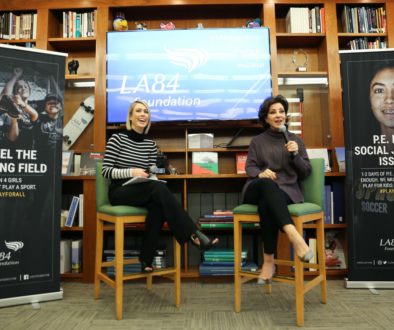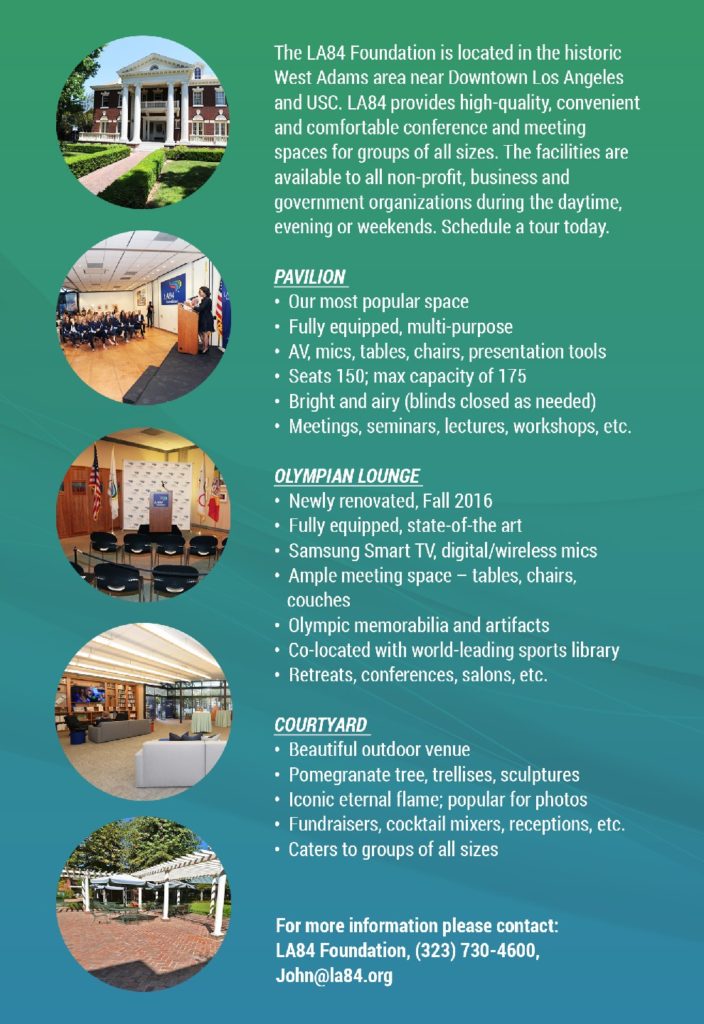SL Interview: “We Could Be King” Director Judd Ehrlich
 For years, students at Martin Luther King High School considered Germantown High School to be their archrivals. The two schools, located about a mile apart, vied for athletic supremacy in northwest Philadelphia.
For years, students at Martin Luther King High School considered Germantown High School to be their archrivals. The two schools, located about a mile apart, vied for athletic supremacy in northwest Philadelphia.
That changed in 2013. Deep budget cuts in the Philadelphia school district forced the closure of 99-year-old Germantown High (as well as about three dozen other schools in the area). The two schools were forced to merge; Germantown High students transferred to King, their green-and-white colors now purple and gold.
The city’s budget crisis also impacted youth sports programs throughout the district. After-school sports activities were suddenly in jeopardy, part of a nationwide trend that has seen some $3.5 billion cut from public school sports programs over the past four years, primarily in low-income neighborhoods.
In the summer of 2013, as the start of classes at King High and the opening game of the football season approached, the situation was in flux. The head coach of the Cougars, Ed Dunn, was a math teacher who had just been laid off. Dunn was planning to coach the Cougars as a volunteer, without any security that he would be rehired, even as he was trying to figure out how to peacefully combine the rosters of Germantown and King.
There was one other obstacle: King High’s football team had not won a game in two years.
This was the scene that awaited director Judd Ehrlich when he went to shoot a documentary about King High’s football team. The film, “We Could Be King,” chronicles the dramatic struggle, and redemption, of the Cougars during the 2013 season in ways that Ehrlich could not have anticipated.
The movie is particularly timely because, on a broader level, it tackles the issue of budget cuts that are becoming commonplace and injurious for after-school sports programs in public high schools across the United States.
Ehrlich is the founder of Flatbush Pictures in New York City. Previously, he directed “Run For Your Life,” a documentary about New York City Marathon creator Fred Lebow, and “Magic Camp,” a documentary about teenagers attending summer camp for aspiring magicians.
He recently spoke to SportsLetter about “We Could Be King” from his offices in Brooklyn.
–David Davis
SportsLetter: You’re based in New York City. How did you come across a story about high school sports in Philadelphia?
Judd Ehrlich: I did a film about the New York City Marathon that premiered at the Tribeca Film Festival, so I had a relationship with the people there. I got a call from a woman named Nancy Schafer. She was the executive director of the Tribeca Film Festival for about 12 years. She was now consulting for them. She was brought on to go out and find filmmakers to pitch a project.
The foundation side of Dick’s Sporting Goods had approached Tribeca with this idea: they wanted to make a documentary film to highlight the issue of underfunded youth sports in public education. They approached Tribeca and said, “Could you find idea pitches from filmmakers about this topic and we’ll help decide which project we want to fund?”
I pitched about four stories about New York City public schools. I have school-aged kids myself, and it’s something I pay close attention to. They turned down those pitches. But I did find this one story in Philadelphia through a local reporter, Brian Hickey, who covers northwest Philadelphia and was reporting on school closures in Philadelphia. It’s the closest major city to New York, but people here, including myself, really don’t understand how dire things are in Philly and the fiscal mess they are in. The summer we pitched the project, there was a $304 million budget shortfall and about three dozen schools ended up being closed.
Brian Hickey had followed football and done some reporting on the Germantown-King merger, about these two rival schools coming together. And then, while the pitch was being considered by Dick’s, a long article about the situation came out in the New York Times by Jeré Longman. I think that might’ve tipped the scales so that Dick’s decided to pick the project.
SL: What was Dick’s motive behind this?
JE: The film was meant to be a big part of their Sports Matter campaign. Their core mission is to bring more attention, more resources, and more funding to this real problem that we have in America: the underfunding of youth sports and the defunding of youth sports in schools.
The campaign raised money for what ended up being over 180 youth sports teams across the country, teams whose funding had been cut for one reason for another. They used a crowdfunding model, where the teams needed to raise half of the money and then Dick’s would come in with the second half of the money. All of the teams ended up being funded.
SL: You point out in the film that approximately $3.5 billion has been cut from public school sports programs over the past several years. Most people are not aware of this particular problem facing youth sports. Why do you think that is?
JE: It’s underreported and under the radar. It’s interesting because there are a lot of people who assume that sports are well-funded and that funding for sports takes away from arts and music funding, those things, rather than seeing them in the same camp. Which is where they are: when extracurricular programs get cut, it’s across the board, and it’s the kids that are losing out on sports, music and art.
Very often in these low-income communities sports are the way that you are going to connect with kids. It’s going to give them the motivation to go to class; it’s going to give them the motivation to get good grades. That is part of what we see in the film.
SL: The football team ended up having this Cinderella season under Coach Ed Dunn. What were your expectations when you started filming the team?
JE: We didn’t know exactly what we would find and how the story would play out. That’s part of the daunting but exciting part about making a documentary film. But win or lose with this team, I felt confident that we would have had an amazing story. A lot of the reasons for that are the people. We had such interesting characters. You have a coach like Coach Dunn: he is the real deal. He’s somebody who left a job in marketing and returned to his community because he wanted to give back. He felt like he could make a difference in his own backyard.
That is true of all of the coaches on the team. They’re all volunteers. They all live in the community and are a part of the community. When they speak to the kids, the kids know that the coaches get it. They know that they grew up the way that they grew up, had friends like Coach Dunn talked about in the film who were shot for no reason, and at an early age dealt with a lot of the same trauma and stresses that people have to deal with in underserved, low-income neighborhoods.
I don’t think that King is unique. If you go to schools across the country, you’re going to find parents, teachers, coaches, volunteers and administrators who really do care and are fighting the good fight every day to make a difference. That is something that is not often portrayed. Win or lose, I think Coach Dunn and the rest of the coaches would’ve made sure that these kids were taken care of, that they got the life lessons that they needed to get out of the season.
Their real mission is to make sure these kids stay in school, that they get an education. For many of those kids, they’re going to be the first or among the first to go to college in their families. And, whether they’re going to a Division I school or not, and whether they think they’re going to play in the NFL or not, this opportunity to go on to higher education is going to change their lives and it’s going to change the lives of their family and their community. That’s having a major impact on dozens and dozens of kids every year.
SL: From your experience in making the film, what is the value of youth sports?
JE: I believe it’s about having a family. For many of these kids it’s a surrogate family that’s really necessary because so few of them have a male role model or a father or even a grandfather in their life. Coach Dunn and all the coaches out there on the field are strong male influences who talk about teamwork and working together for the common good. That’s being part of a family. Coach Dunn uses that language a lot. He says, “We’re a family. I’m your big brother, you’re my little brother,” and he expresses love for these kids. That’s something a lot of these kids are missing.
I have two kids myself. They get everything they could possibly want and need — and yet sports still serves a purpose. It offers so much to so many. Every kid needs to spread their wings beyond their family and find out who they are as a person. The playing field is a safe place to do that. It’s a safe place to test your boundaries, to fail miserably, and yet come back and realize, “Even though I lost that game for the team, I’m still loved by this team, I’m still a part of this team, I’m still valued.” Those are the kinds of lessons that I think kids really need. And, they need that more in communities where their family may not be the strongest backbone for them. They need a place to find that connection, that family, to give them the stability to progress in their lives.
SL: One of the players, Sal Henderson, suffered a concussion while you were filming. Was that a difficult situation to handle?
JE: The reality is that in any sport there’s a risk. These things happen – in football and in every sport. The important thing is the treatment and the follow-through and how the coaches deal with it. You don’t want to let the kid right back on the field. You see in the film that it was handled properly. That really is the most important piece of it.
You are getting hit, and you are getting hit hard, in football. That’s not a secret, and it’s not something we should brush under the rug. Like a lot of sports there are inherent risks to being out there. But because there is such a sensitivity to it, because it is something that people are aware of now, it’s important that the coaches can and do take the necessary steps and precautions. We wanted to show a coaching staff dealing with that. Obviously, it was shocking for everybody, but at the same time it’s something that’s a reality and we didn’t want to sweep it under the rug. We wanted to show what happened in that scenario.
As a plot point and a story point in the film, it was this moment right before the big playoff game, after Sal had come back to the team, and it was at the intersection of the two players that we were following in the film, Sal and [lineman] Dontae Angus. It was this moment that Dontae began to really care about the team, and see it more as a family, and look beyond his own needs. I think the fact that he did get upset about that, that he cared that Sal was injured, showed this burgeoning maturity in his character during the season.
SL: What was the filmmaking process like on this?
JE: The process was very, very intense. Essentially, I moved to Philadelphia for four months. We rented a house around the corner from Germantown High School, in northwest Philadelphia. We really became part of the community. We were there shooting every day for that four months and getting to know the community and the kids.
It was an incredible turnaround time on the project. When we started, they just wanted a 44-minute film. When we saw what we were getting, I called in and said, “I think we’ve got something special here and we’re not going to be able to tell this story in 44 minutes.” We got the sign-off to go longer – and that was before even seeing this Cinderella story begin to unfold. But I think everybody knew from seeing the footage as it was coming in that we had something special.
To create an 80-minute documentary film from beginning to end in essentially eight months is unheard of. You’re with these characters in real time. It’s funny, because after screenings people will ask me, “Where are these kids now? What are they up to?” And I’ll say, “Well, our last shoot was, like, six weeks ago. They’re still seniors or juniors. They’re still pretty much where they are in the film.” People are so used to seeing a film several years after the events of the film.
It’s exciting from that standpoint because everything is also happening right now, in real time, involving the budget crisis within the public schools. It’s a replay, the same budget shortfall that Philadelphia had last year they have again this year. Over the summer, the same thing will play out where they’re going to threaten school closures and teacher layoffs and eliminating after-school sports. Now, this film is part of the conversation.
SL: What was Dick’s involvement in the making and editing of the film?
JE: The nice thing about the relationship with Dick’s is they exercised absolutely zero creative control over the finished product. The concussion scene answers the question as to whether Dick’s had creative control over the film. The fact that the concussion is in the film shows you that we were allowed to tell this story in a very real way.
It really is this sort of groundbreaking and unique model for a corporate partnership in a documentary film. Hopefully, this becomes a new model not only with Dick’s, but other corporations following suit. The budget for a documentary film is a drop in the bucket for these guys. They end up with a finished product that can have a broad impact and can be seen by a lot of people. We ended up not only being on ESPN, but being bumped over to ABC. So, a lot of people saw this film and got a window into a corner of the world that many Americans aren’t aware of or haven’t spent 80 minutes with.
That’s the great thing that can come from a documentary like this, not only highlighting the situation at King, but people start realizing that this is happening in underserved, low-income communities across the country. They start noticing the same sorts of stories in New Orleans, Baltimore, Chicago. They’re closing schools, they’re laying off teachers, charter schools are replacing public schools all over the nation. Hopefully, this film will help spark a conversation about this topic.
SL: Two previous films that you directed, “Magic Camp” and “Mayor of the West Side,” involved stories about teenagers. Why are you so drawn to telling stories about youth?
JE: I do find that I’m drawn to stories about adolescence because it really is a time when you’re finding out who you are, and you’re finding your voice. As a filmmaker, coming-of-age stories is that time where you’re able to see, often over short periods of time, a lot of intense change and intense emotion.
With all these stories, there are through lines about mentorship and finding the right mentor for a kid, and about community and about ways that kids connect to one another and to adults. Those connections are so interesting and so important.
SL: “We Could Be King” has aired already on ESPN and ABC. What are future plans for the film?
JE: The film is being released on digital platforms and VOD on August 12. We’re excited to say that this summer we’ll be back at King shooting Dick’s Sporting Goods “Hell Week” for ESPN, which will air at the end of August.
SL: What’s your next film project?
JE: I am working on a documentary called “Science Fiction Land” that tells the story of the actual science fiction film that was depicted in the film “Argo.” It’s quite different from the story that you see in “Argo.” We were working on it before we got the commission to do “We Could Be King.” We took a break and we’re coming back to it now.




